初中英语动词时态复习讲义(全)
- 格式:doc
- 大小:60.00 KB
- 文档页数:8
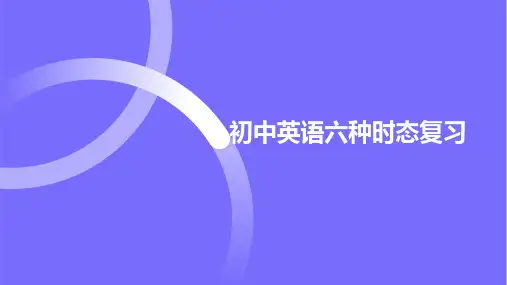

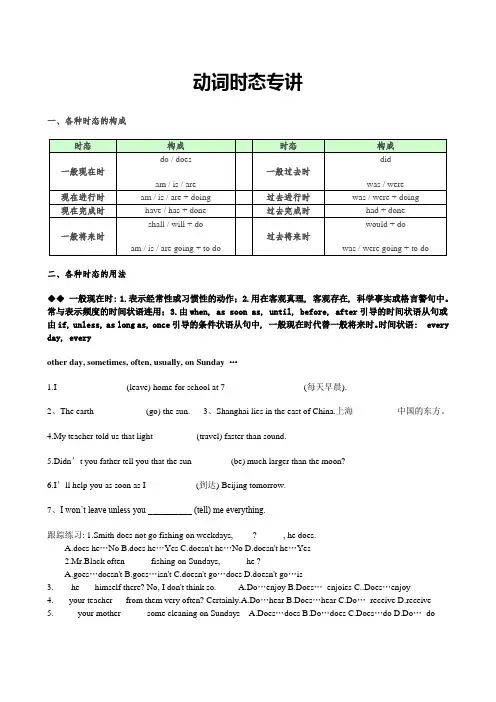
动词时态专讲一、各种时态的构成二、各种时态的用法◆◆一般现在时: 1.表示经常性或习惯性的动作;2.用在客观真理, 客观存在, 科学事实或格言警句中。
常与表示频度的时间状语连用;3.由when, as soon as, until, before, after引导的时间状语从句或由if, unless, as long as, once引导的条件状语从句中, 一般现在时代替一般将来时。
时间状语: every day, everyother day, sometimes, often, usually, on Sunday …1.I (leave) home for school at 7 _________________ (每天早晨).2、The earth ___________ (go) the sun.3、Shanghai lies in the east of China.上海__________中国的东方。
4.My teacher told us that light _________ (travel) faster than sound.5.Didn’t you father tell you that the sun ________ (be) much larger than the moon?6.I’ll help you as soon as I ___________(到达) Beijing tomorrow.7、I won’t leave unless you __________ (tell) me everything.跟踪练习: 1.Smith does not go fishing on weekdays, ____? _____ , he does.A.does he…NoB.does he…YesC.doesn't he…NoD.doesn't he…Yes2.Mr.Black often _____ fishing on Sundays, _____ he ?A.goes…doesn'tB.goes…isn'tC.doesn't go…doesD.doesn't go…is3.____he ___himself there? No, I don't think so. A.Do…enjoy B.Does…enjoies C..Does…enjoy4.___ your teacher __ from them very often? Certainly.A.Do…hear B.Does…hear C.Do…receive D.receive5._____ your mother _____ some cleaning on Sundays A.Does…does B.Do…does C.Does…do D.Do…do一般过去时: 1.表示在确定的过去时间里所发生的动作或存在的状态。

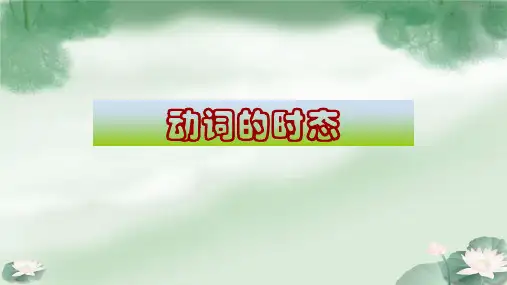
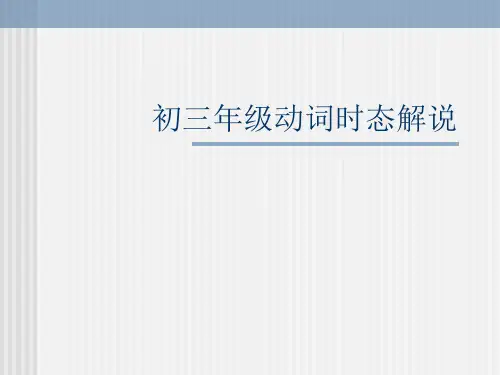
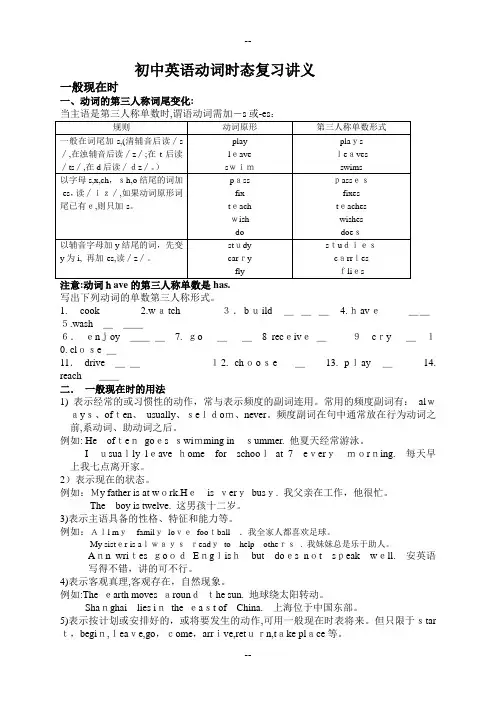
初中英语动词时态复习讲义一般现在时一、动词的第三人称词尾变化:写出下列动词的单数第三人称形式。
1.cook _______2.watch________3.build_________4.have________5.wash________6.enjoy______7. go _________8 receive______9cry______10. close ________11.drive_______ 12. choose______13. play ________14. reach ________二.一般现在时的用法1) 表示经常的或习惯性的动作,常与表示频度的副词连用。
常用的频度副词有:always、often、usually、seldom、never。
频度副词在句中通常放在行为动词之前,系动词、助动词之后。
例如: He oftengoes swimming insummer. 他夏天经常游泳。
Iusually leave home for schoolat 7everymorning.每天早上我七点离开家。
2)表示现在的状态。
例如:My father is at work.Heis verybusy. 我父亲在工作,他很忙。
The boy is twelve. 这男孩十二岁。
3)表示主语具备的性格、特征和能力等。
例如:All myfamilylovefootball.我全家人都喜欢足球。
My sister is alwaysreadyto help others. 我妹妹总是乐于助人。
Ann writes goodEnglishbut does not speak well.安英语写得不错,讲的可不行。
4)表示客观真理,客观存在,自然现象。
例如:The earth moves aroundthe sun. 地球绕太阳转动。
Shanghai lies inthe east of China.上海位于中国东部。
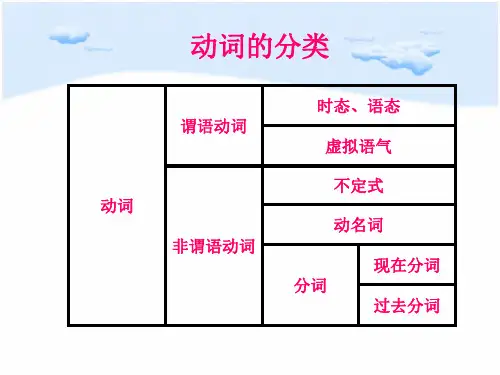

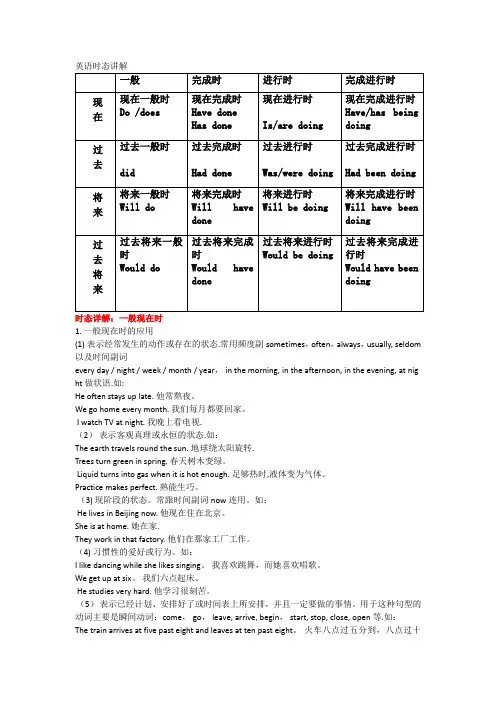
英语时态讲解1.一般现在时的应用(1)表示经常发生的动作或存在的状态.常用频度副sometimes,often,always,usually,seldom 以及时间副词every day/night/week/month/year,in the morning,in the afternoon,in the evening,at nig ht做状语.如:He often stays up late.他常熬夜。
We go home every month.我们每月都要回家。
I watch TV at night.我晚上看电视.(2)表示客观真理或永恒的状态.如:The earth travels round the sun.地球绕太阳旋转.Trees turn green in spring.春天树木变绿。
Liquid turns into gas when it is hot enough.足够热时,液体变为气体。
Practice makes perfect.熟能生巧。
(3)现阶段的状态。
常跟时间副词now连用。
如:He lives in Beijing now.他现在住在北京。
She is at home.她在家.They work in that factory.他们在那家工厂工作。
(4)习惯性的爱好或行为。
如:I like dancing while she likes singing。
我喜欢跳舞,而她喜欢唱歌。
We get up at six。
我们六点起床。
He studies very hard.他学习很刻苦。
(5)表示已经计划、安排好了或时间表上所安排,并且一定要做的事情。
用于这种句型的动词主要是瞬间动词:come,go,leave,arrive,begin,start,stop,close,open等.如:The train arrives at five past eight and leaves at ten past eight。
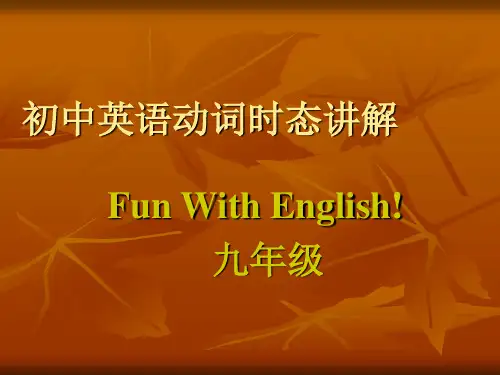
初中英语动词时态复习讲义一般现在时一、动词的第三人称词尾变化:写出下列动词的单数第三人称形式。
1. cook _______2.watch________3.build_________4.have________5.wash________6. enjoy ______7. go _________8 receive ______9 cry______10. close ________11. drive _______ 12. choose ______13. play ________14. reach ________二. 一般现在时的用法1)表示经常的或习惯性的动作,常与表示频度的副词连用。
常用的频度副词有:always、often、usually、seldom、never。
频度副词在句中通常放在行为动词之前,系动词、助动词之后。
例如: He often goes swimming in summer. 他夏天经常游泳。
I usually leave home for school at 7 every morning. 每天早上我七点离开家。
2)表示现在的状态。
例如:My father is at work.He is very busy. 我父亲在工作,他很忙。
The boy is twelve. 这男孩十二岁。
3)表示主语具备的性格、特征和能力等。
例如:All my family love football .我全家人都喜欢足球。
My sister is always ready to help others . 我妹妹总是乐于助人。
Ann writes good English but does not speak well. 安英语写得不错,讲的可不行。
4)表示客观真理,客观存在,自然现象。
例如:The earth moves around the sun. 地球绕太阳转动。
Shanghai lies in the east of China. 上海位于中国东部。
5)表示按计划或安排好的,或将要发生的动作,可用一般现在时表将来。
但只限于start,begin,leave,go,come,arrive,return,take place等。
例如:The train leaves at six tomorrow morning. 火车明天上午六点开。
He comes back tonight. 他今晚回来。
6)在复合句中,当主句是一般将来时,时间或条件状语从句的谓语动词只能用一般现在时来表示将来要发生的动作。
例如:I'll tell him the news when he comes back. 他回来时,我将告诉他这个消息。
If you take the job , they will talk with you in greater details.如果你接受这份工作,他们将和你谈谈细节。
巩固练习:1、Lucy likes going skating with her friends. (改写成否定句)________________________________________________________2、Aunt Li’s son has ten toy bears. (对划线部分提问)________________________________________________________3、His watch costs 300 yuan. (变成一般疑问句并否定回答)________________________________________________________4、I like being a nurse for the old. (变成一般疑问句)________________________________________________________5、张叔叔每天乘坐地铁上班。
________________________________________________________6、我们每周日常花三小时在图书馆看书。
________________________________________________________7、我爷爷常常晚饭后出去散步。
________________________________________________________一般过去时写出下列动词的过去式形式。
1. put ________2. drink _______3. cry _______4. pull ________5. ride ________6.begin ________7. sit ________8. run _________9. take _________ 10.sweep _______ 11. stop _______ 12. solve _______13. rob ________14. wait _________15. lie _________ 16. turn _______17. explore _______18. drop _______19. clean ______20. produce _____21.get __________ugh________23.pay________24.die_________25.prefer ______二. 一般过去时的用法1)表示过去某个时间所发生的动作或存在的状态。
常和表示过去的时间状语yesterday, last week, an hour ago,just now, the other day, in 1982等连用。
在一般过去式中,要表达“过多少时间之后”,一般用after。
几年后。
例如:Where did you go just now? 刚才你上哪儿去了?After a few years,she started to play the piano.几年后,她开始弹钢琴。
2)表示在过去,经常或反复发生的动作。
常与often,always等表示频度的副词连用。
例如:When I was a child, I often played football in the street.我是个孩子的时候,常在马路上踢足球。
3)一般过去式也可与today,this week,this month,this year等表现在的时间壮语连用,但这些时间壮语须指过去的时间,决不包含“现在”“此时此刻”的意思。
例如:Did you see him today?今天你看见他了吗?巩固练习:1、Yesterday I went swimming.(改写成否定句。
)________________________________________________________2、He was born in Shanghai.(对划线部分提问)________________________________________________________3我昨天买了一辆新自行车。
________________________________________________________4、我前天读了一本书。
________________________________________________________一般将来时一、一般将来时的构成:助动词will+动词原形在口语中,will在名词或代词后常缩为’ll,wii not常简缩为won’t。
在疑问句中,主语为第一人称时(I和we)时,常用助动词shall。
例如:She’ll go to play basketball. 她要去打篮球。
Shall we go to the zoo? 我们要去动物园吗?二、一般将来时的用法1、表示将来某个时间要发生的动作或存在的状态,常与tomorrow, next year等连用。
例如:I'll meet you at the school gate tomorrow morning.2、表示将来经常或反复发生的动作。
例如:I’ll come and see you every Saturday next year.明年我将每个星期六来看你。
3、表示说话人对于将来的看法、假设和推测,通常用be afraid,be/feel sure,hope,know,think 等后面的从句或与副词perhaps,possibly,maybe等连用。
例如:I think she’ll go back home for supper. 我想她会回家吃饭。
Maybe she’ll go to the gym.也许她会去体育馆。
三、be going to +不定式,表示将来。
1、表示主语进行某一行动的打算意图。
这种打算常经过预先考虑并含有自己做好某些准备的意思。
即计划,安排要发生的事。
例如:What are you going to do tomorrow? 明天打算作什么呢?The play is going to be produced next month。
这出戏下月开播。
2、表示说话人确信如此或有某种迹象表明某事即将发生。
例如:Look at the dark clouds, there is going to be a storm. 看那乌云,快要下雨了。
3、注意:be going to 和will之间的区别。
○1两者都用于预测时,be going to意指有迹象表明某件事将要发生,属客观的推测;will 则意指说话人认为/相信某件事将要发生,属主观的推测。
○2两者在时间的发生上,be going to通常表示马上要发生或相当快就要发生的事情;而will不指明任何具体时间,可以指遥远的未来。
例如:He is gong in to be better. 他的病就要好起来了。
He will be better. 他的病会好起来了。
○3两者都表示意图时,be going to含有预先计划、准备的意思;will则指未经过预先思考或计划,是临时的一种决定。
○4在条件壮语从句中,be going to表将来,will表意愿。
例如:If you are going to make a journey, you'd better get ready for it as soon as possible.如果你将要去旅行,最好尽快做好准备。
Miss Gao will tell you the answer if you ask her. 如果你去问高老师,她会告诉你答案。